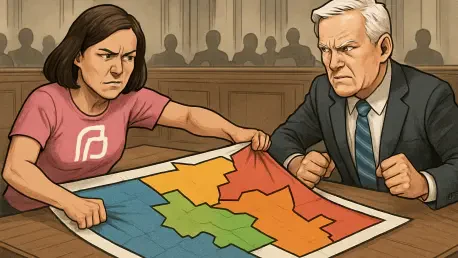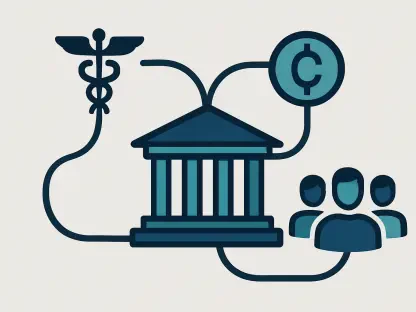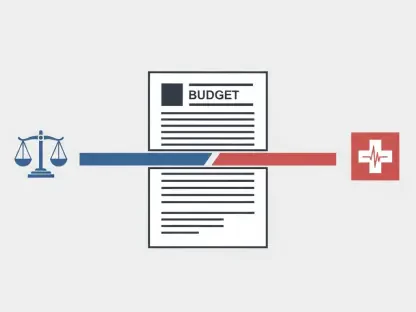Imagine a political landscape where access to health care hinges on the drawing of district lines, a scenario unfolding right now as advocacy groups and lawmakers clash over congressional maps in a heated battle for influence. With reproductive rights and health funding under threat from Republican-led policies, Planned Parenthood has emerged as a key player in a bold redistricting push, particularly in California. This roundup dives into diverse opinions, strategies, and analyses from various stakeholders—advocacy leaders, political analysts, and public policy experts—to explore how redistricting is becoming a battleground for health care access. The purpose is to unpack the complexities of this partisan struggle, compare contrasting views, and shed light on what it means for democracy and public health.
Diving into the Political Clash Over Health Care and Representation
Planned Parenthood’s Strategic Shift to Electoral Politics
Insights from health advocacy circles reveal a significant pivot by Planned Parenthood, especially in California, toward direct involvement in electoral strategies. Leaders in the reproductive rights space argue that with substantial cuts to federal health programs and restrictions on abortion services, engaging in redistricting battles is no longer optional but essential. This marks a departure from traditional advocacy focused solely on service provision and policy lobbying, highlighting a willingness to influence political power structures directly.
Contrasting opinions emerge from within the advocacy community itself, with some expressing concern that such deep political involvement could blur the lines between health care missions and partisan agendas. A segment of nonprofit strategists suggests that this move risks alienating moderate supporters who prioritize neutrality over electoral combat. The debate centers on whether this aggressive stance will strengthen or fracture the broader coalition fighting for health access.
California’s Controversial Redistricting Proposal
Political analysts across the spectrum weigh in on California’s proposed overhaul of congressional districts, designed to favor Democratic representation. Supporters within progressive think tanks frame this as a necessary countermeasure to Republican gerrymandering in states like Texas, emphasizing that without such action, health care funding and reproductive rights could face even steeper declines. They point to the potential shift of several House seats as a critical step to balance national power dynamics.
On the other hand, critics from conservative policy groups argue that altering maps mid-decade undermines voter trust and democratic norms, especially in a state with an established independent redistricting commission. Some neutral election observers caution that public perception of fairness could suffer, potentially sparking backlash even among those who oppose GOP health policies. This tension reveals a deeper divide over whether the ends justify the means in this high-stakes political game.
GOP Policies and Public Sentiment as Catalysts
Republican Health Care Cuts Sparking Outrage
Policy experts focusing on health care budgets highlight the scale of Republican-driven reductions, including massive slashes to Medicaid and blocks on reimbursements for non-abortion services at clinics like Planned Parenthood. Many in the public health sector assert that these measures disproportionately harm low-income communities, fueling widespread discontent. Polling data consistently cited by analysts shows a majority of Americans opposing such cuts, creating fertile ground for Democratic pushback.
Differing perspectives come from fiscal conservatives who defend these policies as necessary for budget control, arguing that federal spending on health programs has ballooned unsustainably. However, even among this group, there’s acknowledgment that the optics of targeting specific providers like Planned Parenthood can alienate undecided voters. This split in reasoning underscores the challenge of balancing ideological goals with electoral realities in a polarized environment.
Public Opinion as a Double-Edged Sword
Survey researchers and political strategists offer varied takes on how public sentiment shapes this conflict. Many note that disapproval of abortion bans and health funding cuts provides a potential advantage for advocates pushing redistricting reforms, especially in liberal-leaning states. They argue that mobilizing this frustration through voter education could tip the scales in favor of progressive ballot measures.
Conversely, some campaign consultants warn that translating public anger into action is far from guaranteed, particularly in off-year elections where turnout tends to be low. There’s a shared concern that the complexity of redistricting proposals might confuse or disengage voters, diluting the impact of widespread opposition to GOP policies. This discrepancy in views highlights the unpredictable role of public engagement in such technical political maneuvers.
National Implications and Electoral Risks
A Potential Wave of Partisan Redistricting
Election analysts from various research institutes express alarm over the precedent set by California’s redistricting plan, predicting a domino effect across other states. Experts suggest that if successful, this could prompt similar partisan map-drawing in places like Florida or New York, intensifying national electoral volatility ahead of key midterms between now and 2027. The consensus is that such a trend risks destabilizing congressional balance in unforeseen ways.
Opposing viewpoints from state-level policymakers reveal a split on the urgency of this issue. Some Democratic strategists see retaliatory gerrymandering as an inevitable response to GOP tactics, while Republican counterparts decry it as a breakdown of electoral integrity. A smaller group of bipartisan reform advocates argues for federal guidelines to curb mid-decade redistricting entirely, though they admit such consensus is unlikely in the current climate.
Long-Term Consequences for Democracy and Health Access
Scholars of electoral systems and health policy offer sobering predictions about the broader fallout. Many emphasize that escalating partisan mapmaking could erode public trust in fair representation, with ripple effects on how health care debates are framed and funded at the federal level. They point to the intertwining of these issues as a critical challenge for maintaining equitable access to services.
A contrasting perspective from political historians suggests that while the short-term chaos is real, such conflicts have historically led to reforms when public pressure mounts. They argue that advocacy groups like Planned Parenthood could leverage this moment to push for systemic change if they sustain focus on voter outreach. This divergence in long-term outlooks reflects the uncertainty of navigating uncharted political territory.
Reflecting on a Polarized Battle and Paths Forward
Looking back, the roundup of perspectives paints a vivid picture of a deeply divided landscape where health care, reproductive rights, and electoral fairness collide with fierce intensity. The insights gathered from advocacy leaders, policy experts, and election analysts illuminate the stakes of Planned Parenthood’s redistricting push against GOP funding cuts, revealing both the potential for strategic gains and the risks of deepening partisan rifts. For those invested in these issues, the next steps involve focusing on grassroots education to demystify redistricting proposals and build informed voter bases. Additionally, forming broader coalitions across health and democracy-focused organizations is seen as vital to amplify impact. Staying updated on state-level redistricting developments and supporting local health initiatives emerge as practical ways to influence outcomes in this ongoing struggle.









